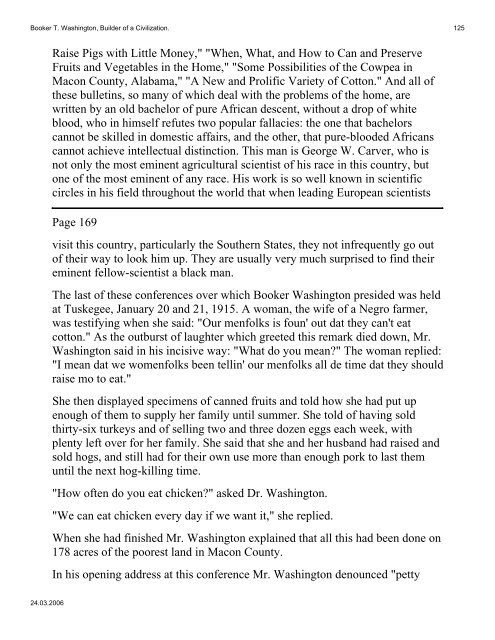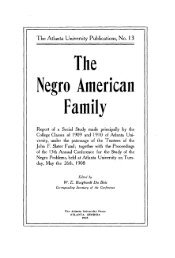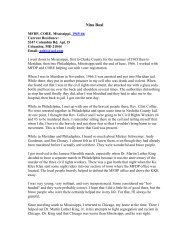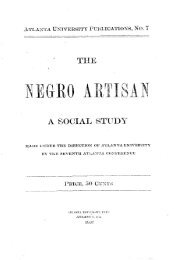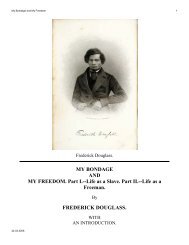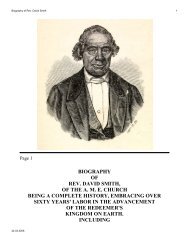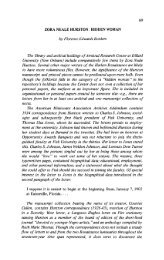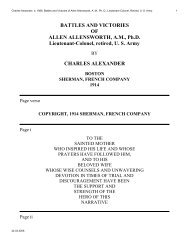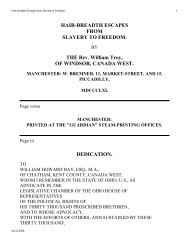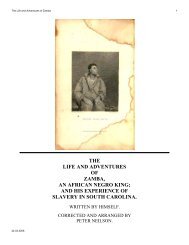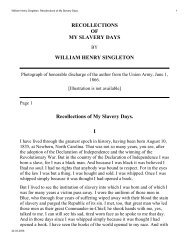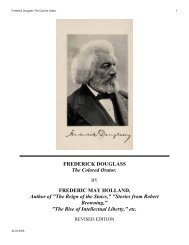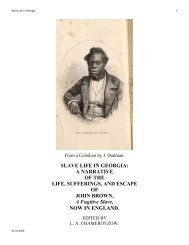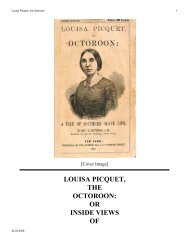Booker T. Washington, Builder o - African American History
Booker T. Washington, Builder o - African American History
Booker T. Washington, Builder o - African American History
You also want an ePaper? Increase the reach of your titles
YUMPU automatically turns print PDFs into web optimized ePapers that Google loves.
<strong>Booker</strong> T. <strong>Washington</strong>, <strong>Builder</strong> of a Civilization. 125<br />
Raise Pigs with Little Money," "When, What, and How to Can and Preserve<br />
Fruits and Vegetables in the Home," "Some Possibilities of the Cowpea in<br />
Macon County, Alabama," "A New and Prolific Variety of Cotton." And all of<br />
these bulletins, so many of which deal with the problems of the home, are<br />
written by an old bachelor of pure <strong>African</strong> descent, without a drop of white<br />
blood, who in himself refutes two popular fallacies: the one that bachelors<br />
cannot be skilled in domestic affairs, and the other, that pure-blooded <strong>African</strong>s<br />
cannot achieve intellectual distinction. This man is George W. Carver, who is<br />
not only the most eminent agricultural scientist of his race in this country, but<br />
one of the most eminent of any race. His work is so well known in scientific<br />
circles in his field throughout the world that when leading European scientists<br />
Page 169<br />
visit this country, particularly the Southern States, they not infrequently go out<br />
of their way to look him up. They are usually very much surprised to find their<br />
eminent fellow-scientist a black man.<br />
The last of these conferences over which <strong>Booker</strong> <strong>Washington</strong> presided was held<br />
at Tuskegee, January 20 and 21, 1915. A woman, the wife of a Negro farmer,<br />
was testifying when she said: "Our menfolks is foun' out dat they can't eat<br />
cotton." As the outburst of laughter which greeted this remark died down, Mr.<br />
<strong>Washington</strong> said in his incisive way: "What do you mean?" The woman replied:<br />
"I mean dat we womenfolks been tellin' our menfolks all de time dat they should<br />
raise mo to eat."<br />
She then displayed specimens of canned fruits and told how she had put up<br />
enough of them to supply her family until summer. She told of having sold<br />
thirty-six turkeys and of selling two and three dozen eggs each week, with<br />
plenty left over for her family. She said that she and her husband had raised and<br />
sold hogs, and still had for their own use more than enough pork to last them<br />
until the next hog-killing time.<br />
"How often do you eat chicken?" asked Dr. <strong>Washington</strong>.<br />
"We can eat chicken every day if we want it," she replied.<br />
When she had finished Mr. <strong>Washington</strong> explained that all this had been done on<br />
178 acres of the poorest land in Macon County.<br />
In his opening address at this conference Mr. <strong>Washington</strong> denounced "petty<br />
24.03.2006


